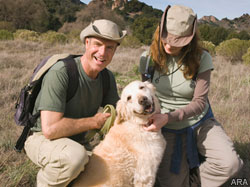(ARA) – To many people, a pet is not just an animal, but a member of the family. In fact, U.S. pet owners spent $50 billion on maintaining their pets’ happiness according to the 2010 National Pet Owners Survey.
However, pet ownership comes with additional responsibilities that many pet owners fail to realize or understand, which can lead to fines, bad relations with their neighbors, or worse, putting another person or pet in danger.
Before you invest in a pet, whether it’s a dog, cat, or a pot-bellied pig, it’s important to become familiar with local ordinances involving pets. Whether you have experience as a pet owner or are completely new to the experience, it’s critical to learn as much as you can about your responsibilities as a pet owner. Here are some tips from Findlaw.com, a leading online source of legal information, on how to be a responsible pet owner and help keep your pet safe.
* Carefully research your pet’s breed. It’s critical for you to understand your pet and the behavior that’s considered typical of its breed. Some pets and breeds of animals (dogs, cats, etc.) should absolutely not be matched with children. There are also some breeds, such as pitbulls, that carry additional responsibility for a pet owner.
* Get a license for your pet. Many towns and cities require an annual license for your pet. Not securing a license can lead to fines if your pet gets out of your control or bites someone.
* Tag your pet. Buy a leash and put a tag on it with your pet’s name, your name, address and phone number. If your pet should somehow leave your property or get lost while traveling, a tag will help another person contact you faster to reconnect you with your pet.
* Keep your pet on your property. One of the fastest ways to ruin your welcome to your neighborhood is to allow your pet to wander off your property. Your fellow neighbors don’t appreciate pets that leave their droppings in their yards or pets that wander a neighborhood getting into mischief and garbage cans. It’s not uncommon for some people to take out their frustration by using web cams to record a neighbor’s pet wandering onto their property, or to take action into their own hands by harming the pet.
* Never give a pet as a gift. It happens every year during the holidays or for a loved one’s birthday: A puppy or kitten is given as a gift. While that might sound adorable, surprising a person who may not be ready to take on the responsibility of pet ownership can turn into an unwelcome gift, especially for the animal.
* Riding in pickup trucks. Approximately 100,000 dogs a year nationwide are killed because they jump from or are thrown from the back of a pickup truck. Many local and state governments now prohibit dogs in the open back of a pickup truck because of the dangers it presents, while some states require a cage or cross ties. Another option to keep your pet safe is to purchase a doggie seatbelt so your dog can ride inside the car.
* Leaving pets in parked cars. Extreme heat can be fatal to pets and owners may face legal consequences for being irresponsible and cruel when leaving their pets in a car without proper ventilation or cooling. On a 78-degree day, temperatures in a car parked in the shade can exceed 90 F and hit a scorching 160 F if parked in the sun. Owners can be fined or arrested for cruelty to animals.
* Keep them on a leash. Most dog parks and public areas have laws requiring dogs to be on a leash. If they aren’t, they could be taken to the pound. If your pet does roam free, you will be responsible for any damages that they cause to someone’s property or another person. Consider carrying an umbrella insurance policy in the event that your dog bites another person and you are sued for damages.
* Pooper-scoopers. Doggie droppings are seen as a form of environmental pollution and present hazardous health conditions when not cleaned up according to local and state ordinances. Pet owners can face a fine if they do not pick up after Fido.
* No pets allowed. Most standard leases and rental agreements contain a “no pets” clause. If your landlord discovers that you have a pet, he or she may demand that you get rid of the pet or simply evict you for breaking the terms of your contract. Make sure you consult your lease or check with your landlord before getting a pet.
* Barking dog. Most communities have noise ordinances against loud pets. You could even be fined for causing a nuisance within the community. Most importantly, respect any noise curfews so you don’t keep your neighbors awake at night.
* Flushing a fish. Don’t do it. A larger fish can become stuck in the pipes and could cause immense plumbing problems. Also, a lot of bacteria and parasites can be attached to the fish and you don’t want that anywhere near a household appliance, especially one that is used frequently. Instead dispose of a dead fish (or other small household pets like birds, turtles, lizards, etc.) in the trash.
* Exotic pets. Some people desire to own an exotic species, such as reptiles, birds, monkeys, large cats or even small farm animals such as pigs and chickens. Before purchasing any animal, make sure it’s legal. You can be heavily fined for being in the possession of some species, especially those that are endangered or those that are outlawed by a city ordinance.
For more information about the legal responsibilities of owning a pet, visit www.findlaw.com.

